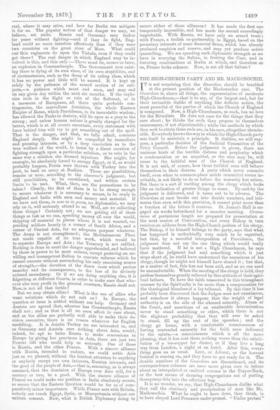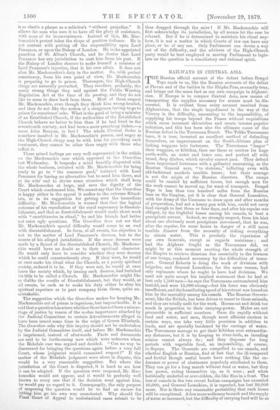THE HIGH-CHURCH PARTY AND MR. MACKONOCHIE.
IT is not surprising that the Guardian should be troubled at the present position of the lVfackonochie case, The Guardian is, above all things, the representative of moderate High-Churchmen,—that is to say, of the largest and, but for their invincible dislike of anything like definite action, the most powerful of the parties of which the Church of England is composed. Now, a High-Churchman, as such, has no love for the Ritualists. He does not care for the things that they care about ; he thinks the ends they propose to themselves unnecessary, if not objectionable ; while the methods by which they seek to attain these ends are, in his eyes, altogether abomin- able. Everybody knows the way in which the High-Church party sets itself to maintain a principle. It dislikes, we will sup- pose, a particular decision of the Judicial Committee of the Privy Council. Before the judgment is given, there are ominous hints of the terrible distress and perplexity which a condemnation or an acquittal, as the case may be, will cause to the faithful sons of the Church of England. It is not said, of course, how these faithful sons will behave themselves in their distress. A party which never commits itself, even when to common-place minds committal seems in- evitable, is not likely to do so before the necessity has arisen. But there is a sort of rustling among the clergy which looks like an indication of greater things to come. By-and-by the judgment is delivered, and it turns out to be adverse. The Guardian at once breaks out into double numbers, and inti- mates that even with this provision, it cannot print more than a fraction of the letters it receives. St. James's Hall is en- gaged six weeks beforehand for a monster meeting. Grava- mina of portentous length are prepared for presentation at the next session of Convocation, and every Bishop in turn receives an address from the High-Church portion of his clergy. The Bishop, if he himself belongs to the party, says that what has happened is undoubtedly very much to be regretted, but that, by a merciful interposition of Providence, the judgment does not say the one thing which would really have mattered. If he is not a High Churchman, he says that if the judgment had said something which it just stops short of, he could have understood the uneasiness of his clergy, though he might not himself have shared it ; but that, as a matter of fact, this has not been said, and so no one need be uncomfortable. When the meeting of the clergy is held, they profess themselves greatly relieved by this attitude of theirepiri- tual fathers. To have the faith reasserted in this triumphant manner by the Spiritualty is far more than a compensation for the theological blunders of a lay tribunal. By this time it has probably been discovered that the Judges were not unanimous, and somehow it always happens that the weight of legal authority is on the aide of the silenced minority. Abuse. of the Court, and assertions of an unalterable determination, never to stand something or other, which there is not the slightest probability that they will ever be asked to stand, fill up the rest of the speeches ; and. the clergy go home, with a comfortable. consciousness of having contended earnestly for the . faith once delivered to the saints,—a consciousness which is all the more pleasing, that it has cost them nothing worse than the substi- tution of a tea-supper for dinner, or if they live a long way from London, a night at an hotel. After this, every- thing goes on as usual. Lent, or Advent, or the harvest festival is coming on, and they have to get ready for it. The double numbers of the Guardian are discontinued, and its correspondence columns axe once more given over to letters about an interpolated or omitted comma in the Prayer-Book, or the best means of shaming congregations out of putting threepenny-bits into the offertory bag. It is no wonder, we say, that High-Churchmen dislike what they call the obstinacy and precipitation of men like Mr. Mackonochie. What he ought to have done, they think, ia to have obeyed Lord Penzance under protest. "Under protest' is as elastic a phrase as a solicitor's "without prejudice." It allows the man who uses it to have all the glory of resistance, with none of its inconveniences. Instead of this, Mr. Mac- konoehie's protest takes the shape of positive defiance. He is not content with putting off the responsibility upon Lord Penzance, or upon the Bishop of London. He is the appointed guardian of St. Alban's Church, and he denies that Lord Penzance has any jurisdiction to oust him from his post. If the Bishop of London chooses to make himself a minister of Lord Penzance's injustice, that is his own affair. It does not alter Mr. Mackonochie's duty in the matter. So, with perfect consistency, from his own point of view, Mr. Mackonochie is preparing to go to prison. Thereupon, the High-Church clergy are naturally perturbed. They recollect, probably, the many strong things they said against the Public Worship Regulation Act at the time of its passing, and they do not like to seem to draw back from them. Most of them respect Mr. Mackonochie, even though they think him wrong-headed, and they do not like the notion of a clergyman having to go to prison for conscience' sake. What is the good of being a minister of an Established Church, if the authorities of the Established Church behave no better to him than if he had lived in the seventeenth century, and had been a mere preaching tinker,—a mere John Bunyan, in fact? The whole Clerical Order is somehow insulted in Mr. Mackonochie's person, and angry as the High-Church clergy may be with him for provoking such treatment, they cannot be other than angry with those who inflict it.
These mixed feelings are very well represented in the article on the Mackonochie case which appeared in the Guardian last Wednesday. It bespeaks a mind heartily disgusted with the whole business, irritated with Mr. Maclronochie for being ready to go to "the common gaol," irritated with Lord Penzance for having no alternative but to send him there, and at its wits' end to devise some eirenicon which shall keep Mr. Mackonochie at large, and save the dignity of the Court which condemned him, We cannot say that the Guardian is happy either in the appeal it makes to the extreme Ritual- lets, or in its suggestion for getting over the immediate difficulty. Mr. Mackonochie is warned that that the logical outcome of his repudiation of the royal supremacy is disestab- lishment, and that as disestablishment would make short work with " exorbitancies in ritual," he and his friends had better not raise ugly questions. The Guardian does not see that Mr. Mackonochie's special difficulty would come to an and with disestablishment. In form, at all events, his objection is tot to the matter of Lord Penzance's decrees, but to the source of his alleged jurisdiction. If the same decrees were made by a Synod of the disestablished Church, Mr. Mackono- chie would have no doubt as to their spiritual character. He would only have to consider whether they were decrees which he could conscientiously obey. If they were, he would at once make his ritual what the Church, as a purely spiritual society, ordered it to be. If they were not, he would at once leave the society which, by issuing such decrees, had forfeited its title to be called a Church. Mr. Mackonochie might like or dislike the results of Disestablishment, but they would, at all events, be such as to make his duty either to obey his spiritual superiors or to part company from them, quite un- mistakable.
The suggestion which the Guardian makes for keeping Mr. Mackonochie out of prison is ingenious, but impracticable. It is said that a question has arisen whether there has not been a miscar- riage of justice by reason of the undue importance attached by the Judicial Committee to certain Advertisements alleged to have been issued some time in the reign of Queen Elizabeth. The Guardian asks why this inquiry should not be undertaken by the Judicial Committee itself, and before Mr. Mackonochie is imprisoned, instead of afterwards. Facts and documents are said to be forthcoming now which were unknown when the Ridsdale case was argued and decided. "Can no way be discovered for bringing the questions again before a very full Court, whose judgment would command respect ?" If the matter of the Ridsdale judgment were alone in dispute, this would be a very reasonable suggestion. But where the jurisdiction of the Court is disputed, it is hard to see how it can be adopted. If the question were reopened, Mr. Mac- konochie would not appear, and it would be perfectly well known to every one that if the decision went against him, he would pay no regard to it. Consequently, the only purpose of reopening the question would be to find an excuse for letting him go his own way unmolested. Why should the Final Court of Appeal in ecclesiastical cases submit to be
thus dragged through the mire If Mr. Mackonochie will first acknowledge its jurisdiction, by all means let the case be reheard. But if he is determined to maintain his ritual any- how, it is not a matter in which Courts of law can have any place, or be of any use. Only Parliament can devise a way out of the difficulty, and the advisers of the High-Church party would be best employed in moving Parliament to legis- late on the question in a conciliatory and rational spirit.



































 Previous page
Previous page